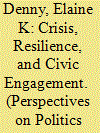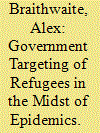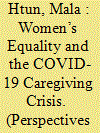|
|
|
Sort Order |
|
|
|
Items / Page
|
|
|
|
|
|
|
| Srl | Item |
| 1 |
ID:
186657


|
|
|
|
|
| Summary/Abstract |
Extending theories of social exclusion and elite messaging, we argue that Trump’s targeted rhetoric toward Asian Americans during the COVID-19 pandemic pushes the racial group, largely “Independent” or nonpartisan affiliated, to lean more towards the Democratic Party. We support this claim by combining social media (Study 1) and survey data (Study 2) analysis. Tracing 1.4 million tweets, we find that Trump’s rhetoric has popularized racially charged coronavirus-related terms and that exclusionary, anti-Asian attitudes have increased in the United States since the pandemic began. Next, by analyzing repeated cross-sectional weekly surveys of Asian Americans from July 2019 to May 2020 (n=12,907), we find that the group has leaned more towards the Democratic Party since Trump first made inflammatory remarks towards Asian Americans. Whites, Blacks, and Latina/os, on the other hand, exhibited fewer and less consistent changes in Democratic Party-related attitudes. Our findings suggest that experiences with social exclusion that are driven by elite sources further cement Asian Americans as Democrats.
|
|
|
|
|
|
|
|
|
|
|
|
|
|
|
|
| 2 |
ID:
186654


|
|
|
|
|
| Summary/Abstract |
The scientific advisory committee is a neglected political institution whose importance became clear during the COVID-19 pandemic. What I call “the paradox of scientific advice” consists in that the two basic expectations from scientific advisory committees—neutrality and usefulness—are inherently in tension. To be useful, advisers must help governments set and attain their goals. Judgments about values and ends are necessary for useful advice, as are subjective judgments in the face of uncertainty and disagreement. This puts the committee in a double bind: if it tries to be more useful, it compromises the neutrality that is the source of its authority and legitimacy; if it tries to remain neutral, it sacrifices usefulness. I argue that this dilemma cannot be solved within the committee but that broader democratic scrutiny could mitigate its force. Advisory committees, in turn, should be structured to facilitate this scrutiny.
|
|
|
|
|
|
|
|
|
|
|
|
|
|
|
|
| 3 |
ID:
186649


|
|
|
|
|
| Summary/Abstract |
We examine economic policy responses to the COVID-19 induced economic collapse in Germany (a coordinated market economy) and the UK (a liberal market economy). The two countries responded to the symmetric economic shock with very similar furlough and business credit schemes to stabilize the demand and supply sides of the economy. However, since these policies fed into very different political-economic structures in both countries, they produced very different results. We attribute this divergence to the effect of “institutional complementarities,” the notion in Varieties of Capitalism that different elements of a system are mutually articulated and, therefore, mutually reinforcing beyond their initial contribution, or vice versa. Our results serve as a cautionary tale to policymakers that introducing policy elements developed in other institutional contexts is complex and challenge us to consider systematically the way in which institutional frameworks actively shape policy outcomes.
|
|
|
|
|
|
|
|
|
|
|
|
|
|
|
|
| 4 |
ID:
186655


|
|
|
|
|
| Summary/Abstract |
How do economic shocks and financial resilience shape civic engagement, especially for the economically insecure? I turn to the early months of the coronavirus pandemic for insights. In April 2020, with more than 23 million adults unemployed, the US government asked residents to participate in the constitutionally mandated decennial census. I test how variations in income shocks from the shutdown and sources of financial resilience predict disparities in census completion, a civic act designed to minimize participation barriers. First, I use nationally representative survey data to demonstrate that policies that protect the economically vulnerable from the full impacts of economic shocks also predict higher census completion rates. Then, I use Google Trends data to show that high unemployment search volume interacted with low resilience to predict depressed census completion. Findings shed light on how economic crises can widen participation gaps—with representation and resource consequences—and how policies that lessen acute economic shocks may reduce participation disparities.
|
|
|
|
|
|
|
|
|
|
|
|
|
|
|
|
| 5 |
ID:
186645


|
|
|
|
|
| Summary/Abstract |
How do social movement organizations involved in abortion debates leverage a global crisis to pursue their goals? In recent months there has been media coverage of how anti-abortion actors in the United States attempted to use the COVID-19 pandemic to restrict access to abortion by classifying abortion as a non-essential medical procedure. Was the crisis “exploited” by social movement organizations (SMOs) in other countries? I bring together Crisis Exploitation Theory and the concept of discursive opportunity structures to test whether social movement organizations exploit crisis in ways similar to elites, with those seeking change being more likely to capitalize on the opportunities provided by the crisis. Because Twitter tends to be on the frontlines of political debate—especially during a pandemic—a dataset is compiled of over 12,000 Tweets from the accounts of SMOs involved in abortion debates across four countries to analyze the patterns in how they responded to the pandemic. The results suggest that crisis may disrupt expectations about SMO behavior and that anti- and pro-abortion rights organizations at times framed the crisis as both a “threat” and as an “opportunity.”
|
|
|
|
|
|
|
|
|
|
|
|
|
|
|
|
| 6 |
ID:
186650


|
|
|
|
|
| Summary/Abstract |
We investigate how the outbreak of epidemics can affect host governments’ targeting of refugees and violation of their physical integrity rights. We argue that governments target repression against refugees for two reasons. First, refugees are easily scapegoated for the arrival of epidemics at a time when governments are looking to shift the blame for their own poor performance. Second, crises provide circumstances for governments to engage in opportunistic repression to further their goal of coercing existing refugees to depart and deterring new refugees from arriving. Drawing upon a global dataset of countries for the years 1996 to 2015, we demonstrate that epidemic outbreaks do indeed increase the likelihood and scale of government repression targeting refugee populations. These effects are especially pronounced in countries with higher proportions of refugees hosted and in less democratic countries. Identification of this potential for government repression of refugees during epidemics is important in light of the grave scale of the ongoing COVID-19 pandemic. Our findings suggest the international community should be vigilant for signs of governments’ mistreatment of vulnerable refugee populations to shift focus away from their own poor handling of crises such as the ongoing COVID-19 pandemic and opportunistically advance their goal of reducing the numbers of refugees hosted locally.
|
|
|
|
|
|
|
|
|
|
|
|
|
|
|
|
| 7 |
ID:
186647


|
|
|
|
|
| Summary/Abstract |
We draw on new and original data to examine both partisan and systemic inequities that have fueled the spread of COVID-19 in Native America. We show how continued political marginalization of Native Americans has compounded longstanding inequalities and endangered the lives of Native peoples. Native nations have experienced disproportionate effects from prior health epidemics and pandemics, and in 2020, Native communities have seen greater rates of infection, hospitalization, and death from COVID-19. We find that Native nations have more COVID-19 cases if they are located in states with a higher ratio of Trump supporters and reside in states with Republican governors. Where there is longstanding marginalization, measured by lack of clean water on tribal lands and health information in Native languages, we find more COVID-19 cases. Federal law enables non-members to flout tribal health regulations while on tribal lands, and correspondingly, we find that COVID-19 cases rise when non-members travel onto tribal lands. Our findings engage the literatures on Native American politics, health policy within U.S. federalism, and structural health inequalities, and should be of interest to both scholars and practitioners interested in understanding COVID-19 outcomes across Tribes in the United States.
|
|
|
|
|
|
|
|
|
|
|
|
|
|
|
|
| 8 |
ID:
186652


|
|
|
|
|
| Summary/Abstract |
Why did some Bolivian departments have more success containing COVID-19 than others? We argue that low government legitimacy hampers coordinated responses to national crises, particularly where political polarization is severe and the crisis response becomes politicized. Low legitimacy can intensify the challenges of poverty and poor infrastructure. An original dataset of daily observations on subnational coronavirus policy and cell phone mobility data, paired with administrative data on cases and deaths, suggests that political divisions influenced governors’ policy implementation and citizens’ compliance. In departments that opposed the president, policies were more likely to deviate from the stricter national policy while mobility and protest activity were high. In departments aligned with the president, local policy followed national policy and citizens complied with policy and quarantine restrictions for a longer period of time.
|
|
|
|
|
|
|
|
|
|
|
|
|
|
|
|
| 9 |
ID:
186656


|
|
|
|
|
| Summary/Abstract |
We explore the US states’ evolving policy responses to the COVID-19 pandemic by examining governors’ decisions to begin easing five types of social distancing policies after the initial case surge in March–April 2020. Applying event history models to original data on state COVID-19 policies, we test the relative influence of health, economic, and political considerations on their decisions. We find no evidence that differences in state economic conditions influenced when governors began easing. Governors of states with larger recent declines in COVID-19 deaths per capita and improving trends in new confirmed cases and test positivity were quicker to ease. However, politics played as powerful a role as epidemiological conditions, driven primarily by governors’ party affiliation. Republican governors made the policy U-turn from imposing social distancing measures toward easing those measures a week earlier than Democratic governors, all else equal. Most troubling of all, we find that states with larger Black populations eased their social distancing policies more quickly, despite Black Americans’ higher exposure to infection from SARS-CoV-2 and subsequent death from COVID-19.
|
|
|
|
|
|
|
|
|
|
|
|
|
|
|
|
| 10 |
ID:
186644


|
|
|
|
|
| Summary/Abstract |
Much of this special issue of Perspectives on Politics speaks to the impact of the ongoing COVID-19 pandemic on marginalized groups such as refugees, caregivers, and racial and ethnic minority populations. The reality of unequal experiences of COVID-19 has become even clearer since these articles were solicited in the early months of the pandemic, at a point when many in the public sphere were still seeking to reassure us that “the virus doesn’t discriminate,” or that “we are all in it together.” Researching how politics feeds into these unequal impacts of the pandemic has the potential to illuminate the central role of power and powerlessness in generating well-being and illness. These are important questions that one of us has tried to answer in some of her own work (Lynch Reference Lynch2020; Bambra, Lynch, and Smith Reference Bambra, Lynch and Smith2021). It heartens us to see the field of political science asking, and trying to answer, questions about the relationship between politics and the public’s health using the full range of intellectual and methodological tools at our disposal.
|
|
|
|
|
|
|
|
|
|
|
|
|
|
|
|
| 11 |
ID:
186648


|
|
|
|
|
| Summary/Abstract |
The COVID-19 pandemic provides a unique opportunity to examine how local governments respond to a public health crisis amid high levels of partisan polarization. As an arena that has historically been relatively insulated from national partisan cleavages, public schools provide a useful window into understanding the growing nationalization of local politics. Leveraging the fact that all school districts had to adopt a reopening plan in fall 2020, we assess the factors that influenced school district reopening decisions. We find that mass partisanship and vested interests best explain the degree to which schools reopened. Republican (Democratic) districts were far more (less) likely to reopen in person, while districts with stronger unions relied more on remote learning. Notably, we find little connection between reopening decisions and indicators measuring the severity of the virus. Finally, public schools were sensitive to the threat of student exit. Districts located in counties with more Catholic schools were somewhat more likely to reopen in person. We assess the implications of these findings for U.S. education policy and the study of local government more generally.
|
|
|
|
|
|
|
|
|
|
|
|
|
|
|
|
| 12 |
ID:
186651


|
|
|
|
|
| Summary/Abstract |
We document the broad patterns of COVID-19 as it affects minority communities. We present a theoretical framework rooted in Global North democracies’ racial and ethnic legacies to analyze the health and economic disparities between these communities and the white majority population. Marshalling first-cut empirical evidence from the United States, the United Kingdom, the Netherlands, and Sweden, we find patterns of the pandemic’s distribution consistent with how the burden of racial and ethnic legacies endures: people from minority communities have worse health and economic outcomes under normal circumstances, inequalities the COVID-19 crisis has exacerbated. The comparison shows that the impact of racial and ethnic discrimination on pandemic policy outcomes is not unique to the United States. Health inequalities stemming in part from patterns of institutional racism and discrimination perversely help reproduce these societal inequities. We find that governments’ initial responses have failed to mitigate the disproportionate impact of this health and economic crisis on minority communities because they did not acknowledge or address the particular challenges that these groups face.
|
|
|
|
|
|
|
|
|
|
|
|
|
|
|
|
| 13 |
ID:
186653


|
|
|
|
|
| Summary/Abstract |
Scholars have long been skeptical of citizens’ ability to vote on the basis of their policy views. Voters lack incentives to pay attention to politics and so are often unaware of the policy stances adopted by presidential candidates and parties. However, some scholars have suggested that voter attention may increase when policy issues become important to them, such as when a crisis disrupts their lives. The coronavirus pandemic provides an opportunity to test this proposition. It is one of the most severe crises the United States has faced. It has disrupted almost everyone’s lives, and many people know someone who has tested positive or died from the virus. It is thus salient and important to many—if not most—voters. Despite this context, we find that many voters remain unaware of the 2020 US Presidential candidates’ stances on coronavirus policies. Their levels of knowledge are about typical for other policies, which is middling. In the absence of knowledge, voters cannot connect their policy views on the virus with their presidential voting decisions.
|
|
|
|
|
|
|
|
|
|
|
|
|
|
|
|
| 14 |
ID:
186646


|
|
|
|
|
| Summary/Abstract |
Non-uniform compliance with public policy by citizens can undermine the effectiveness of government, particularly during crises. Mitigation policies intended to combat the novel coronavirus offer a real-world measure of citizen compliance, allowing us to examine the determinants of asymmetrical responsiveness. Analyzing county-level cellphone data, we leverage staggered roll-out to estimate the causal effect of stay-at-home orders on mobility using a difference-in-differences strategy. We find movement is significantly curtailed, and examination of descriptive heterogeneous effects suggests the key roles that partisanship and trust play in producing irregular compliance. We find that Republican-leaning counties comply less than Democratic-leaning ones, which we argue underlines the importance of trust in science and acceptance of large-scale government policies for compliance. However, this partisan compliance gap shrinks when directives are given by Republican leaders, suggesting citizens are more trusting of co-partisan leaders. Furthermore, we find that higher levels of social trust increase compliance; yet these gains attenuate or intensify depending upon community-level partisan sentiments. Our study provides a real-world, behavioral measure that demonstrates the influence of partisanship, social trust, and their interaction on citizen welfare. Finally, we argue that our results speak to how trust in government may impact successful containment of the COVID-19 pandemic.
|
|
|
|
|
|
|
|
|
|
|
|
|
|
|
|
| 15 |
ID:
186658


|
|
|
|
|
| Summary/Abstract |
The COVID-19 pandemic revealed, but did not create, the caregiving crisis in the United States: for most people, it was already a major ordeal to provide reproductive labor. The caregiving crisis was less visible before the pandemic because it was suffered unequally, in part due to the different positions of American women. Some women paid other women to do care work, women received differing sets of benefits from federal and state governments, and some women got far more support from their employers than did others. Pandemic-induced shocks, including the closure of K–12 schools and childcare centers, and reduced access to domestic workers and elder care workers, seemed to have triggered a closer alignment of perspectives and interests among diverse women. Although women’s demands for support seem to have pushed the Biden administration to propose more expansive family policies, stereotypes and norms that marginalize care work and care workers within families and across the economy also need to change to achieve equality for women.
|
|
|
|
|
|
|
|
|
|
|
|
|
|
|
|
|
|
|
|
|